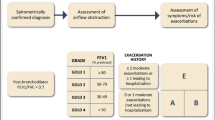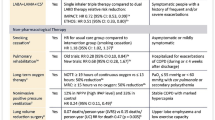Abstract
Background
Considering that the innate immune system plays a pivotal role in the pathogenesis of chronic obstructive pulmonary disease (COPD), we hypothesized that functional single-nucleotide polymorphisms (SNPs) of innate immune genes affect the disease phenotype and prognosis.
Aim
To elucidate the contribution of common functional TLR2 and TLR4 SNPs and genotypic deficiency of the mannose-binding lectin (MBL) protein, both as single parameters and in combination, in Greek COPD patients.
Results
In a cohort of 114 Greek COPD patients, we confirmed that the presence of TLR4-D299G or TLR4-T399I SNPs was significantly associated with an earlier COPD stage (p = 0.003 and p = 0.009, respectively). In comparison, the absence of any analyzed polymorphism, including those of TLR2-R753Q and genotypic MBL deficiency, was significantly associated with a more severe disease phenotype, characterized by more frequent exacerbations (p = 0.045).
Conclusion
Our findings support the notion that the presence of innate immune SNPs, such as functional polymorphisms of TLRs along with MBL deficiency, might exert a protective effect on the COPD phenotype, similar with other immune-mediated disorders.
Zusammenfassung
Hintergrund
Das System der angeborenen Immunität spielt eine entscheidende Rolle bei der Pathogenese der chronisch obstruktiven Lungenerkrankung (COPD). Die Autoren stellten die Hypothese auf, dass funktionelle Polymorphismen („single nucleotide polymorphisms“; SNPs) von Genen des angeborenen Immunsystems Einfluss auf den Erkrankungsphänotyp und der Prognose der COPD haben.
Ziel
Ziel war die Untersuchung der Beteiligung von funktionellen TLR2- und TLR4-SNPs des Toll-like-Rezeptors einerseits und des genotypischen Mangels an MBL-Protein (mannosebindendes Lektin) andererseits, sowohl als singuläre Parameter und in Kombination, bei griechischen COPD-Patienten.
Ergebnisse
In einer Kohorte von n = 114 griechischen COPD-Patienten bestätigten die Autoren die signifikante Assoziation von TLR4-D299G- (p = 0,003) oder TLR4-T399I- (p = 0,009) Polymorphismen mit den frühen Stadien der COPD. Im Gegensatz hierzu war das Fehlen der untersuchten Polymorphismen, inklusive des TLR2-R753Q-Polymorphismus und des genotypischen MBL-Mangels, mit einem ungünstigen Erkrankungsphänotyp mit signifikant (p = 0,045) vermehrten COPD-Exazerbationen assoziiert.
Schlussfolgerung
Die vorliegenden Ergebnisse unterstützen die Auffassung, dass SNPs von Genen der angeborenen Immunität, wie funktionelle Polymorphismen von TLR und der genotypische MBL-Mangel, protektive Effekte auf den COPD-Phänotyp haben könnten, ähnlich wie bei weiteren immunvermittelten Erkrankungen.
Similar content being viewed by others
References
Lopez AD, Mathers CD, Ezzati M, Jamison DT, Murray CJ (2006) Global and regional burden of disease and risk factors, 2001: systematic analysis of population health data. Lancet 367:1747–1757
Taraseviciene-Stewart L, Douglas IS, Nana-Sinkam PS, Lee JD, Tuder RM, Nicolls MR, Voelkel NF (2006) Is alveolar destruction and emphysema in chronic obstructive pulmonary disease an immune disease? Proc Am Thorac Soc 3:687–690
Sharma G, Hanania NA, Shim YM (2009) The aging immune system and its relationship to the development of chronic obstructive pulmonary disease. Proc Am Thorac Soc 6:573–580
Pauwels R, Rabe K (2004) Burden and clinical features of chronic obstructive pulmonary disease (COPD). Lancet 364:613–620
Brusselle GG, Joos GF, Bracke KR (2011) New insights into the immunology of chronic obstructive pulmonary disease. Lancet 378:1015–1026
D’Hulst AI, Maes T, Bracke KR, Demedts IK, Tournoy KG, Joos GF, Brusselle GG (2005) Cigarette smoke-induced pulmonary emphysema in scid-mice. Is the acquired immune system required? Respir Res 6:147
Botelho FM, Gaschler GJ, Kianpour S et al (2010) Innate immune processes are sufficient for driving cigarette smoke-induced inflammation in mice. Am J Respir Cell Mol Biol 42:394–403
Opitz B, van Laak V, Eitel J, Suttorp N (2010) Innate immune recognition in infectious and noninfectious diseases of the lung. Am J Respir Crit Care Med 181:1294–1309
Sethi S, Maloney J, Grove L, Wrona C, Berenson CS (2006) Airway inflammation and bronchial bacterial colonization in chronic obstructive pulmonary disease. Am J Respir Crit Care Med 173:991–998
Hurst JR, Vestbo J, Anzueto A et al (2010) Susceptibilty to exacerbation in chronic obstructive pulmonary disease. N Engl J Med 363:1128–1138
Sinden NJ, Stockley RA (2010) Systemic inflammation and comorbidity in COPD: a result of “overspill” of inflammatory mediators from the lungs? Review of the evidence. Thorax 65:930–936
Wouters EF, Reynaert NL, Dentener MA, Vernooy JH (2009) Systemic and local inflammation in asthma and chronic obstructive pulmonary disease: is there a connection? Proc Am Thorac Soc 6:638–647
Zhang X, Shan P, Jiang G, Cohn L, Lee PJ (2006) Toll-like receptor 4 deficiency causes pulmonary emphysema. J Clin Invest 116:3050–3059
Johnson GB, Brunn GJ, Kodaira Y, Platt JL (2002) Receptor-mediated monitoring of tissue well-being via detection of soluble heparan sulfate by Toll-like receptor 4. J Immunol 168:5233–5239
Maes T, Bracke KR, Vermaelen KY, Demedts IK, Joos GF, Pauwels RA, Brusselle GG (2006) Murine TLR4 is implicated in cigarette smoke-induced pulmonary inflammation. Int Arch Allergy Immunol 141:354–368
Taraseviciene-Stewart L, Voelkel NF (2008) Molecular pathogenesis of emphysema. J Clin Invest 118:394–402
Texereau J, Chiche JD, Taylor W, Choukroun G, Comba B, Mira JB (2005) The importance of Toll-like receptor 2 polymorphisms in severe infections. Clin Iinfect Dis 41(Suppl 7):S408–S415
Pabst S, Yenice V, Lennarz M, Tuleta I, Nickenig G, Gillissen A, Grohe C (2009) Toll-like receptor 2 gene polymorphisms Arg677Trp and Arg753Gln in chronic obstructive pulmonary disease. Lung 187:173–178
Speletas M, Merentiti V, Kostikas K, Liadaki K, Minas M, Gourgoulianis K, Germenis AE (2009) Association of TLR4-T399I polymorphism with chronic pulmonary disease in smokers. Clin Dev Immunol 2009:260286
Ito M, Hanaoka M, Droma Y, Kobayashi N, Yasuo M, Kitaguchi Y, Horiuchi T, Ikegawa K, Katsuyama Y, Kubo K, Ota M (2012) The association of Toll-like receptor 4 gene polymorphisms with the development of emphysema in Japanese subjects: a case control study. BMC Res Notes 5:36
Rohde G, Klein W, Arinir U, Hagedorn M, Duerig N, Bauer TT, Gillissen A, Schultze-Werninghaus G, Epplen JT (2006) Association of the ASP299GLY TLR4 polymorphism with COPD. Resp Med 100:862–866
Budulac SE, Boezen HM, Hiemstra PS, Lapperre TS, Vonk JM, Timens W, Postma DS (2012) Toll-like receptor (TLR2 and TLR4) polymorphisms and chronic obstructive pulmonary disease. PLOS ONE 7:e43124
Sabroe I, Whyte MKB, Wilson AG, Dower SK, Hubbard R, Hall I (2004) Toll-like receptor (TLR) 4 polymorphisms and COPD. Thorax 59:81
Turner MW (2003) The role of mannose-binding lectin in health and disease. Mol Immunol 40:423–429
Koch A, Melbye M, Sørensen P, Homøe P, Madsen HO, Mølbak K, Hansen CH, Andersen LH, Hahn GW, Garred P (2001) Acute respiratory tract infections and mannose-binding lectin insufficiency during early childhood. JAMA 285:1316–1321
Speletas M, Gounaris A, Sevdali E, Kompoti M, Konstantinidi K, Sokou R, Tsitsami E, Germenis AE (2015) MBL2 genotypes and their associations with MBL levels and NICU morbidity in a cohort of Greek neonates. J Immunol Res 2015:478412
Neth OW, Bacher U, Das P, Zabelina T, Kabisch H, Kroeger N, Ayuk F, Lioznov M, Waschke O, Fehse B, Thiébaut R, Haston RM, Klein N, Zander AR (2010) Influence of mannose- binding lectin genotypes and serostatus in allo-SCT: analysis of 131 recipients and donors. Bone Marrow Transpl 45:13–19
Lin CL, Siu LK, Lin JC, Liu CY, Chian CF, Lee CN, Chang FY (2011) Mannose-binding lectin gene polymorphism contributes to recurrence of infective exacerbation in patients with COPD. Chest 139:43–51
Mandal J, Malla B, Steffensen R, Costa L, Egli A, Trendelenburg M, Blasi F, Kostikas K, Welte T, Torres A, Louis R, Boersma W, Milenkovic B, Aerts J, Rohde GGU, Lacoma A, Rentsch K, Roth M, Tamm M, Stolz D (2015) Mannose-binding lectin protein and its association to clinical outcomes in COPD: a longitudinal study. Respir Res 16:150
Vestbo J, Hurd SS, Agustí AG, Jones PW, Vogelmeier C, Anzueto A, Barnes PJ, Fabbri LM, Martinez FJ, Nishimura M, Stockley RA, Sin DD, Rodriguez-Roisin R (2013) Global strategy for the diagnosis, management, and prevention of chronic obstructive pulmonary disease: GOLD executive summary. Am J Respir Crit Care Med 187:347–65
American thoracic society (1998) Standardization of spirometry, 1994 update. Am J Resp Crit Care Med 152:1107–1136
Stolz D, Boersma W, Blasi F, Louis R, Milenkovic B, Kostikas K et al (2014) Exertional hypoxemia in stable COPD is common and predicted by circulating proadrenomedullin. Chest 146:328–338
Liadaki K, Petinaki E, Skoulakis C, Tsirevelou P, Klapsa D, Germenis AE, Speletas M (2011) Toll-like receptor 4 gene (TLR4), but not TLR2, polymorphisms modify the risk of tonsillar disease due to Streptococcus pyogenes and Haemophilus influenzae. Clin Vaccine Immunol 18:217–222
Arbour NC, Lorenz E, Schutte BC, Zabner J, Kline JN, Jones M, Frees K, Watt JL, Schwartz DA (2000) TLR4 mutations are associated with endotoxin hyporesponsiveness in humans. Nat Genet 25:187–191
Agnese DM, Calvano JE, Hahm SJ, Coyle SM, Corbett SA, Calvano SE, Lowry SF (2002) Human toll-like receptor 4 mutations but not CD14 polymorphisms are associated with an increased risk of gram-negative infections. J Infect Dis 186:1522–1525
Van der Graaf CA, Netea MG, Morré SA, Den Heijer M, Verweij PE, Van der Meer JW, Kullberg BJ (2006) Toll-like receptor 4 Asp299Gly/Thr399Ile poly- morphisms are a risk factor for Candida bloodstream infection. Eur Cytokine Netw 17:29–34
Ferwerda B, McCall MB, Verheijen K, Kullberg BJ, van der Ven AJ, van der Meer JW, Netea MG (2008) Functional consequences of toll-like receptor 4 polymorphisms. Mol Med 14:346–352
Hawn TR, Scholes D, Li SS, Wang H, Yang Y, Roberts PL, Stapleton AE, Janer M, Aderem A, Stamm WE, Zhao LP, Hooton TM (2009) Toll-like receptor polymorphisms and susceptibility to urinary tract infections in adult women. PLOS ONE 4:e5990
Yuan FF, Marks K, Wong M, Watson S, de Leon E, McIntyre PB, Sullivan JS (2008) Clinical relevance of TLR2, TLR4, CD14 and FcgammaRIIA gene polymorphisms in Streptococcus pneumoniae infection. Immunol Cell Biol 86:268–270
Kompoti M, Michopoulos A, Michalia M, Clouva-Molyvdas PM, Germenis AE, Speletas M (2015) Genetic polymorphisms of innate and adaptive immunity as predictors of outcome in critically ill patients. Immunobiology 220:414–421
Garred P (2008) Mannose-binding lectin genetics: from A to Z. Biochem Soc Trans 36:1461–1466
Hansen TK, Thiel S, Dall R, Rosenfalck AM, Trainer P, Flyvbjerg A, Jørgensen JO, Christiansen JS (2001) GH strongly affects serum concentrations of mannan-binding lectin: evidence for a new IGF-I independent immunomodulatory effect of GH. J Clin Endocrinol Metab 86:5383–5388
Barnes PJ (2013) New anti-inflammatory targets for chronic obstructive pulmonary disease. Nat Rev Drug Discov 12:543–559
Acknowledgements
The authors would like to thank Ms. Evangelia Karamouti for her excellent technical assistance.
Author information
Authors and Affiliations
Corresponding author
Ethics declarations
Conflict of interest
M. Noutsias received presentation honoraria by Applied Biosystems, Bayer, and Novartis. A. Apostolou, T. Kerenidi, A. Michopoulos, K.I. Gourgoulianis, A.E. Germenis, and M. Speletas declare that they have no competing interests related to this study.
The study was conducted in accordance with the principles of the Helsinki Declaration and was approved by the Institutional Review Board of the University Hospital of Larissa, Greece.
Additional information
Author contributions. A. Apostolou and A. Michopoulos performed the experiments; T. Kerenidi and K.I. Gourgoulianis provided patients’ samples and clinical data; A.E. Germenis provided reagents and intellectual input; T. Kerenidi and M. Speletas analyzed the data; M. Noutsias was involved in writing and editing the manuscript; M. Speletas designed the study, supervised the experiments, and wrote the manuscript. All authors reviewed and approved the final manuscript.
Rights and permissions
About this article
Cite this article
Apostolou, A., Kerenidi, T., Michopoulos, A. et al. Association between TLR2/TLR4 gene polymorphisms and COPD phenotype in a Greek cohort. Herz 42, 752–757 (2017). https://doi.org/10.1007/s00059-016-4510-9
Received:
Accepted:
Published:
Issue Date:
DOI: https://doi.org/10.1007/s00059-016-4510-9
Keywords
- Chronic obstructive pulmonary disease
- Genetic polymorphisms
- Toll-like receptor 2
- Toll-like receptor 4
- Mannose-binding lectin protein deficiency




